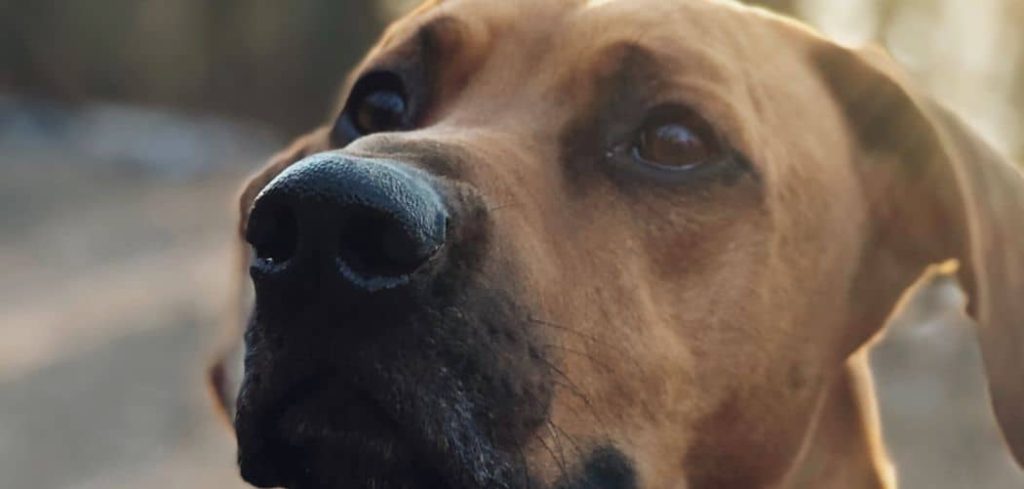Seeing your older dog cough up phlegm can be unsettling and often signals an underlying issue with the respiratory or digestive system.
We outline the common reasons why an old dog may cough up phlegm, what you can do at home, and when to seek veterinary help.
Table of Contents
Old Dog Coughing Up Phlegm: Why It Happens
Coughing up phlegm in older dogs can be caused by a variety of respiratory, cardiac, or gastrointestinal conditions. Common triggers include chronic bronchitis, tracheal collapse, heart disease, lung infections, or even reflux-related irritation.
The phlegm is typically mucus that has accumulated in the airways and is expelled during coughing or gagging.
Observing the color, consistency, and frequency of the phlegm, along with any other symptoms such as lethargy or labored breathing, can help identify the severity of the problem and guide veterinary care.

Old Dog Coughing Up Phlegm: Common Causes
Chronic Bronchitis
Chronic bronchitis is a long-term inflammation of the lower airways, leading to persistent coughing in older dogs.
Excess mucus produced by the inflamed bronchi often appears as phlegm when expelled.
Owners may notice a hacking cough that worsens at night or during activity, wheezing, and reduced stamina.
Over time, chronic bronchitis can compromise lung function and quality of life, making veterinary evaluation and ongoing management important.
Read more: Old Dog Coughing Up White Foam (Understanding the Causes)
Tracheal Collapse
Tracheal collapse occurs when the cartilage rings supporting the windpipe weaken, causing the trachea to narrow.
This results in a characteristic honking cough and can lead to phlegm accumulation if mucus builds in the narrowed airway.
Signs include difficulty breathing, gagging, coughing triggered by excitement or pressure on the neck, and intermittent cyanosis of the gums during severe episodes.
Left unmanaged, tracheal collapse can cause airway damage and increase the risk of secondary infections.
Heart Disease
Heart disease in older dogs can lead to fluid accumulation in the lungs and airways, which mixes with mucus and produces phlegm during coughing. Congestive heart failure is a common cause of this symptom.
You may notice labored or rapid breathing, fatigue, swollen abdomen or limbs, and reduced activity.
Since fluid buildup can quickly worsen, prompt veterinary care is critical to prevent respiratory distress and maintain your dog’s comfort.
Lung Infections
Bacterial, viral, or fungal infections in the lungs can cause phlegm production as the body attempts to clear pathogens from the airways. Pneumonia, in particular, is a serious cause of coughing up phlegm in older dogs.
Symptoms often include fever, lethargy, reduced appetite, labored breathing, and nasal discharge.
Lung infections can rapidly progress if untreated, and older dogs are especially vulnerable due to weakened immune systems.
Gastroesophageal Reflux
Reflux or vomiting of stomach contents can irritate the throat and airways, prompting coughing and phlegm production. Stomach acid and mucus can trigger gagging or coughing fits in older dogs.
Owners may notice drooling, lip licking, retching without producing food, and occasional vomiting.
Reflux can lead to esophageal irritation and even aspiration pneumonia if left unaddressed, emphasizing the need for veterinary guidance.
Allergies
Exposure to dust, smoke, pollen, or other irritants can inflame the respiratory tract, causing increased mucus production and coughing up phlegm. Older dogs may have heightened sensitivity due to compromised respiratory defenses.
Symptoms may include sneezing, watery eyes, persistent coughing, and difficulty breathing in certain environments.
Identifying and reducing exposure to triggers can help manage symptoms, but chronic irritation warrants veterinary evaluation to rule out underlying disease.
Read more: Old Dog Coughing and Gagging (Causes and Solutions)
What to Do If Your Old Dog Is Coughing Up Phlegm
If your older dog is coughing up phlegm, create a calm and comfortable environment to reduce stress and prevent further irritation. Ensure your dog has access to fresh water to keep mucus thin and promote easier coughing.
Monitor activity levels, appetite, and breathing patterns closely, noting any worsening symptoms or changes in phlegm color or volume.
Avoid administering human medications or cough suppressants, as these can be harmful to dogs.
Keeping a detailed log of coughing episodes, triggers, and phlegm characteristics will aid your veterinarian in making an accurate diagnosis.
Also, maintain a consistent diet and avoid sudden changes in feeding that may exacerbate reflux-related coughing.
When to Call or Visit Your Vet
Contact your veterinarian immediately if your dog exhibits:
- Persistent or worsening coughing with phlegm.
- Labored, rapid, or noisy breathing.
- Blue or pale gums, fainting, or collapse.
- Loss of appetite, vomiting, or pronounced lethargy.
- History of heart, lung, or immune conditions with new respiratory symptoms.
Even if the cough appears mild, recurring phlegm production should be evaluated by a professional. Early intervention can prevent complications, improve your dog’s comfort, and support long-term respiratory health.
Read more: Old Dog Coughing (Causes Explained)
Key Takeaway
Coughing up phlegm in older dogs can stem from chronic bronchitis, tracheal collapse, heart disease, lung infections, reflux, or environmental irritants. While occasional coughing may seem minor, persistent or worsening phlegm production requires veterinary evaluation.
At-home care focuses on keeping your dog calm, monitoring symptoms, ensuring hydration, and tracking cough patterns for the vet.
Timely veterinary care and management of underlying causes can significantly improve an older dog’s respiratory comfort and overall quality of life.
